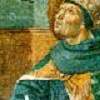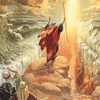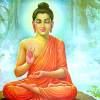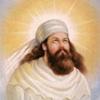Augustine of Hippo
St. Augustine (13 November 354 – 28 August 430) was an important figure in the history of Christianity. He wrote about topics like predestination and original sin. Some of his doctrines separate Western and Eastern Christianity. Augustine lived in Africa during the time of the attack of the Vandals.
Jesus
Jesus is the central figure of Christianity. For believers, he is the Messiah, the son of God and the Virgin Mary, who lived as a Galilean Jew, was crucified under Pontius Pilate, and was resurrected. For many non-believers, Jesus is a source of wisdom. Some non-Christians believe he worked healing and other miracles. At its start, the new messianic religion was considered one of the mystery cults. Some dispute the fact of Jesus’ existence.
Moses
Moses was an early leader of the Hebrews and probably the most important figure in Judaism. He was raised in the court of the Pharaoh in Egypt, but then led the Hebrew people out of Egypt. Moses is said to have talked with God, who gave him tablets inscribed with laws or commandments referred to as the 10 Commandments. Moses’ story is told in the Biblical book Exodus and is short on archaeological corroboration.
Siddhartha Gautama
buddha Siddhartha Gautama was a spiritual teacher of enlightenment who acquired hundreds of followers in India and founded Buddhism. His teachings were preserved orally for centuries before they were transcribed on palm-leaf scrolls. Siddhartha may have been born c. 538 B.C. to Queen Maya and King Suddhodana of the Shakya in ancient Nepal. By the third century B.C. Buddhism appears to have spread to China.
Muhammed
Muhammad (Arabic: محمد; c. 570 CE – 8 June 632 CE),the Prophet of Islam, is seen by non-believers as its founder, but by almost all Muslims as its last prophet sent by God to mankind to restore Islam, which they believe to be the unaltered original monotheistic faith of Adam, Abraham, Moses, Jesus, and other prophets.He united Arabia into a single Muslim polity and ensured that his teachings, practices, and the Quran, which Muslims believe was revealed to him by God, formed the basis of Islamic religious belief.
Zoroaster
Like Buddha, the traditional date for Zoroaster (Greek: Zarathustra) is the 6th Century B.C., although Iranists date him to the 10th/11th century. Information about the life of Zoroaster comes from the Avesta, which contain Zoroaster’s own contribution, the Gathas. Zoroaster saw the world as a struggle between truth and lie, making the religion he founded, Zoroastrianism, a dualistic religion. Ahura Mazda, the uncreated creator God is truth. Zoroaster also taught that there is free will. The Greeks thought of Zoroaster as a sorcerer and astrologer.





